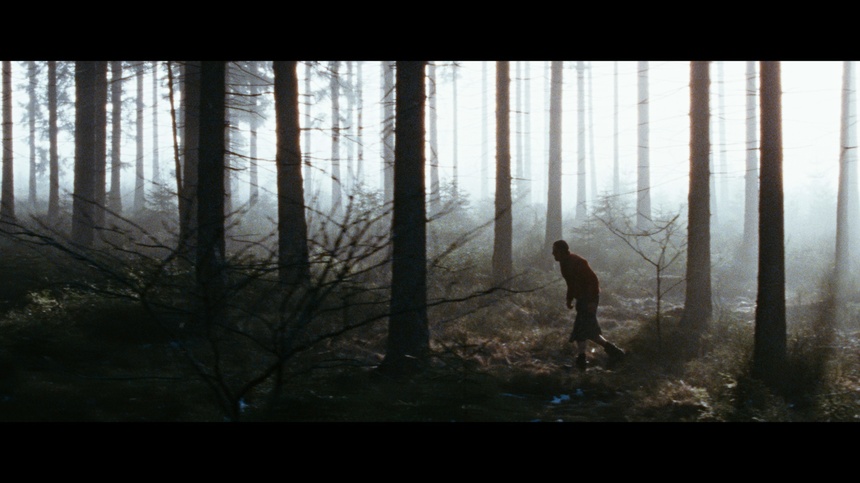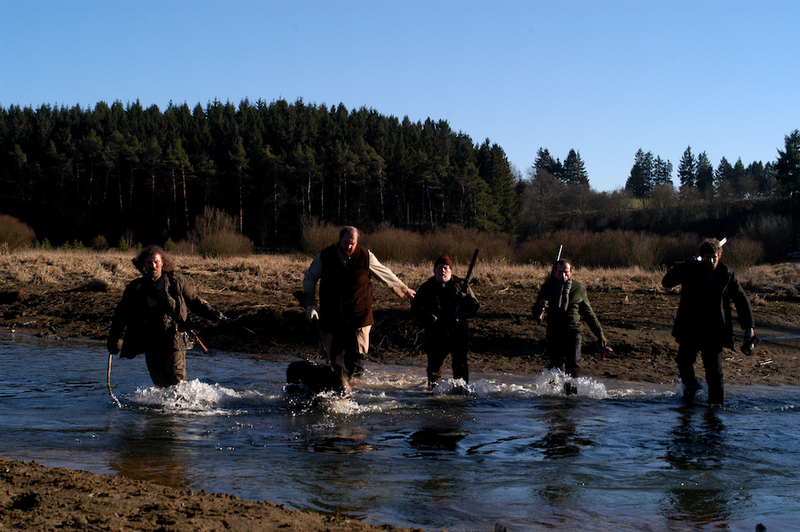CALVAIRE Review: Love Born in Isolation Twists into Cruelty
Laurent Lucas stars in Fabrice du Welz's disturbing feature, re-mastered by Yellow Veil Pictures

Isolation isn't just about physical location; it can be cultural, social, and psychological. It can come as much from class, or strange arbitrary social constructs, as well as those roles set by a patriarchal society whose rules are so convoluted and complex that they are obeyed without reason or forethought. Scratch the surface of most places where people have little contact with people outside their small circle, and you'll find some rather strange beliefs and equally often unfathomable behaviour.
Belgian filmmaker Fabrice du Welz's feature film debut Calvaire is a film that still provokes not only great praise, but also some trepidation and disconcertion, and understandable so. Even almost 20 years after its release, it's a deeply disturbing film, equal parts black comedy and horror story of the kind that makes your spine shiver, and not so much in a good way. It's the first of three of his films set around the Ardennes, telling stories of love, devotion, and madness (You can read my reviews of the other films in the trilogy, Alleluia and Adoration).
Marc (Laurent Lucas) is a third-rate entertainer, singing lounge music with his karaoke machine, to retirements homes in small towns around Belgium. Nevertheless, he manages to attract the attention of women young and old. Yet his lack of desire and the need to be on the road propels him, until his car breaks down in the middle of nowhere. He's brought to what puports to be the local inn, run by Bartel (Jackie Berroyer). Bartel seems a little too excited to have such an 'honoured' guest, and it doesn't seem like Marc's van will be fixed anytime soon.
Marc is completely out of his element, to say the least, and witnessing a group of men on a farm nearby, watching one of their number violate a pig and calling the act 'tender', is enough to send him running back to Bartel. It seems, though, that whatever magnestism Marc possesses rubs off on everyone. Marc quite literally is at a loss for what is happening or how to react: he is used to having a certain kind of power over those around him, since he keeps to those he 'entertains', and usually these are women. In whatever isolated corner of the Ardennes he's ended up in, it seems, there are no women.
Do the men choose to live this way? Have they adapted to it, and have those adaptations also meant the continued absence of women? We can only speculate. But for someone like Marc, a man whose entire persona is based on attracting the affections of those to whom he performs, a man who literally sings for his supper, he finds his strange powers are irrespective of gender. Marc doesn't seem to want anyone's affections, but these men are not like the subdued, if slightly pushy, women in the small towns whom he can charm and walk away from. For Bartel keeps talking about his wife, who left him, and it seems this fixation might now transfer to Marc.
These men, both Bartel, his sometime companion Boris eternally looking for his dog, and the men of the town whom Bartel has cut himself off from, have made a warped community in this lonely place, surrounded by marsh, where everything seems to always be wet and muddy and grey, and you can almost smell something coming from the screen, something buried just enough that you know once it rises to the surface it will be putrid.
In the world where Marc normally travels, the women who feel sexual desire call themselves whores; for the men of this isolated village, women are also whores, but they have control. Someone like Marc, someone who 'performs', is also a 'whore': and in their warped minds, that means they, the audience, should have control. These leads to some horrifying violence, and du Welz does not hold anything back with how deformed these men have become, without this isolation that has bred contempt, anger, and taken all the good out of their world and replaced it with something rotten to the core. Even the 'calvaire' that Marc comes across seems a warped Jesus, as if not even a religious faith could survive this environment.
In one scene in the village bar, a man plays a kind of call to arms on the piano, rousing the men higher and higher into a frenzy that will be released in terrifying ways. It's perhaps a succient metaphor for Calvaire, how a moment of beauty and hope can be twisted when it breeds in the dark.
Calvaire opens in select theatres in the USA on February 24th, followed by a release on digital platforms on March 3rd.
Calvaire
Director(s)
- Fabrice Du Welz
Writer(s)
- Fabrice Du Welz
- Romain Protat
Cast
- Laurent Lucas
- Brigitte Lahaie
- Gigi Coursigny
- Jean-Luc Couchard








